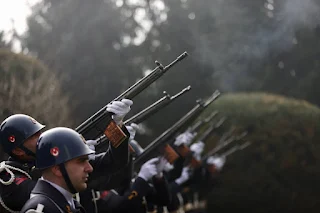Turkey celebrates Martyr's Day and the 109th anniversary of the Ottoman army's victory over the Allied forces in Canakkale, one of the most violent and bloody battles in history, after hundreds of thousands of its soldiers were wiped out with their blood, an epic that will remain a witness to the meaning of human steadfastness.
Monday marks the 109th anniversary of the famous Battle of Canakkale, which Turkey commemorates on March 18 every year, in commemoration of the victory of the Ottoman army over the aggressor forces from Britain, France, Australia and New Zealand, which launched what is known as the “Gallipoli Campaign” during World War I. With the aim of seizing Istanbul, the capital of the Ottoman Empire at that time.
March 18 of each year in Turkey is called “Martyr’s Day,” and events are organized throughout the country, the largest of which is in the province of Canakkale, in the presence of senior Turkish officials. The day is also commemorated in the Turkish Republic of Northern Cyprus and Turkish diplomatic representations abroad.
250 thousand martyrs
At that time, the Allied attempts to control Istanbul failed, and those battles cost the Ottoman Empire more than 250,000 martyrs, in which soldiers from Syria, Iraq, Palestine, and many countries of the Islamic world participated. While the invading forces suffered approximately the same number mentioned above, especially the “Anzac” forces, which was an Australian military force that was formed in Egypt during World War I, and participated with other Allied forces in the invasion of the Gallipoli Peninsula in 1915 AD.
The Ottoman forces confronted the attempt of the Allied fleet (Britain and France) to penetrate the Dardanelles Strait (an international waterway linking the Aegean Sea to the Sea of Marmara) during World War I, with the aim of seizing Istanbul.
At that time, Britain and France wanted to circumvent the other side by controlling the region of the straits and the Sea of Marmara, to secure supply lines for the Russian army, so they sent French and British forces, the latter of which included brigades from Australia and New Zealand, a large military campaign that met the Ottoman army at the Strait of Canakkale (Dardanelles), thinking The battle would be easy, and it would only be weeks before Istanbul fell.
Victory over 4 armies
The idea of storming the Dardanelles originally dates back to Winston Churchill, who was British Minister of the Navy until 1915 AD. The British naval campaign failed (March 18, 1915 AD) when the British fleet collided with a hidden minefield in the waters of the Dardanelles (planted by the crew of the Ottoman ship “Nusret” the night before the attack). ) and was severely damaged as a result.
This failure had a huge resonance throughout the world, and Churchill was dismissed from his position in the British Navy due to his disastrous decision to fight the Battle of Gallipoli.
Then the armies of Britain, France, Australia and New Zealand decided to launch a land campaign on the straits, and in April 1915 AD, the English, Australian and New Zealand armies landed in several directions on the Gallipoli Peninsula, and a French force landed on the Asian coast, but the Ottoman army was able to confront this land campaign, and it also failed.
Annually, a ceremony is held to commemorate the martyrs of the battles of Canakkale in the presence of Turkish officials, leaders, presidents and representatives of other countries.
Tags:
asia
bloody battles
canakkale
canakkale epic
history of turkiye
ottoman
turkey
turkey territory




Brilliant 😊
ReplyDeleteGood
ReplyDeleteGood
ReplyDeleteGood
ReplyDeleteGood
ReplyDeleteGood
ReplyDeleteseveral directions on the Gallipoli Peninsula, and a French force landed on the Asian coast, but the Ottoman army was able to confront
ReplyDeleteSuper
ReplyDeleteGood
ReplyDeleteGreat
ReplyDeleteGood
ReplyDelete